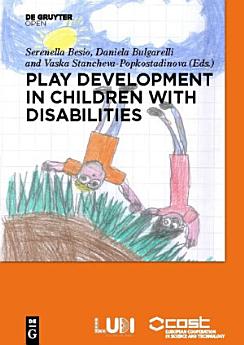Play development in children with disabilties
Serenella Besio · Daniela Bulgarelli · Vaska Stancheva-Popkostadinova
ມ.ກ. 2016 · Walter de Gruyter GmbH & Co KG
3,9star
15 ຄຳຕິຊົມreport
ປຶ້ມອີບຸກ
228
ໜ້າ
reportບໍ່ໄດ້ຢັ້ງຢືນການຈັດອັນດັບ ແລະ ຄຳຕິຊົມ ສຶກສາເພີ່ມເຕີມ
ກ່ຽວກັບປຶ້ມ e-book ນີ້
This book is the result of the first two-year work of Working Group 1 of the network “LUDI – Play for children with disabilities”. LUDI is an Action (2014-2018) financed by COST; it is a multidisciplinary network of more than 30 countries and almost 100 researchers and practitioners belonging to the humanistic and technological fields to study the topic of play for children with disabilities within the framework of the International Classification of Functioning Disability and Health (WHO, 2001).The principal objective of this book is to bring the LUDI contribution to the important topic of play in children with disabilities, because today an international consensus on the definition of play and disabilities is still lacking. The process of ensuring equity in the exercise of the right to play for children with disabilites requests three actions: to approach this topic through a “common language”, at least all over Europe; to put play at the centre of the multidisciplinary research and intervention regarding the children with disabilities; to grant this topic the status of a scientific and social theme of full visibility and recognized authority. Children with disabilities face several limitations in play, due to several reasons: impairments; playgrounds, toys and other play tools that are not accessible and usable; environments and contexts that are not accessible nor inclusive; lack of educational awareness and intentionality; lack of specific psycho-pedagogical and rehabilitative competence; lack of effective intervention methodologies. Moreover, disabled children’s lives are dominated by medical and rehabilitative practices in which play is always an activity aiming to reach an objective or to provoke an improvement; play for the sake of play is considered a waste of time. The concept of play for the sake of play strongly refers to the distinction between play activities and play-like activities. Play activities are initiated and carried out by the player (alone, with peers, with adults, etc.) for the only purpose of play itself (fun and joy, interest and challenge, love of race and competition, ilinx and dizziness, etc.). They have of course consequences on growth and development, but these consequences are not intentionally pursued. Play-like activities are initiated and conducted by an adult (with one or more children), in educational, clinical, social contexts; they are playful and pleasant, but their main objective is other than play: e.g., cognitive learning, social learning, functional rehabilitation, child's observation and assessment, psychological support, psychotherapy, etc. This book, then, contributes to a clear distinction between play and play-like activities that, hopefully, will bring to new developments in play studies.
ການຈັດອັນດັບ ແລະ ຄຳຕິຊົມ
3,9
15 ຄຳຕິຊົມ
ກ່ຽວກັບຜູ້ຂຽນ
Serenella Besio, Aosta, Italy; Daniela Bulgarelli, Aosta, Italy; Vaska Stancheva-Popkostadinova, Blagoevgrad, Bulgaria
ໃຫ້ຄະແນນ e-book ນີ້
ບອກພວກເຮົາວ່າທ່ານຄິດແນວໃດ.
ອ່ານຂໍ້ມູນຂ່າວສານ
ສະມາດໂຟນ ແລະ ແທັບເລັດ
ຕິດຕັ້ງ ແອັບ Google Play Books ສຳລັບ Android ແລະ iPad/iPhone. ມັນຊິ້ງຂໍ້ມູນໂດຍອັດຕະໂນມັດກັບບັນຊີຂອງທ່ານ ແລະ ອະນຸຍາດໃຫ້ທ່ານອ່ານທາງອອນລາຍ ຫຼື ແບບອອບລາຍໄດ້ ບໍ່ວ່າທ່ານຈະຢູ່ໃສ.
ແລັບທັອບ ແລະ ຄອມພິວເຕີ
ທ່ານສາມາດຟັງປຶ້ມສຽງທີ່ຊື້ໃນ Google Play ໂດຍໃຊ້ໂປຣແກຣມທ່ອງເວັບຂອງຄອມພິວເຕີຂອງທ່ານໄດ້.
eReaders ແລະອຸປະກອນອື່ນໆ
ເພື່ອອ່ານໃນອຸປະກອນ e-ink ເຊັ່ນ: Kobo eReader, ທ່ານຈຳເປັນຕ້ອງດາວໂຫຼດໄຟລ໌ ແລະ ໂອນຍ້າຍມັນໄປໃສ່ອຸປະກອນຂອງທ່ານກ່ອນ. ປະຕິບັດຕາມຄຳແນະນຳລະອຽດຂອງ ສູນຊ່ວຍເຫຼືອ ເພື່ອໂອນຍ້າຍໄຟລ໌ໄໃສ່ eReader ທີ່ຮອງຮັບ.




